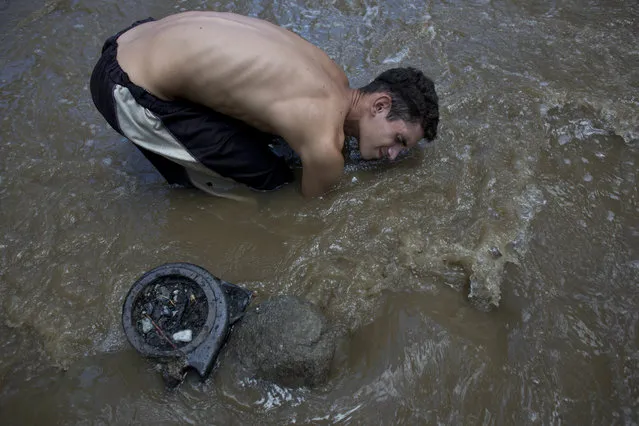
Angel Villanueva waded into the dirty brown water of the Guaire River, the putrid channel snaking through Venezuela's capital, where he hoped to scavenge for a bit of treasure. He raked his hands across the bottom of the shallow waterway, turning his face away from the foul smell. Then he stood up, letting gravel and rocks fall through his fingers, scanning for an earring backing, lost rings or any other bits of precious metal to cash in for food. Scavenging alongside two others, Villanueva, 26, kept an eye on the dark clouds buffeting the mountains that surround Caracas. They could burst at any time, leaving him minutes to get out – or be washed away to his death. “Working in the Guaire isn't easy”, he said, talking over the roar of traffic on a nearby highway. “When it provides, it provides. When it takes, it takes your life”. Images of poor Venezuelans eating from garbage piles in Caracas have come to symbolize the deepening economic crisis in what was once one of Latin America's wealthiest countries. Less visible are the young men and boys who comb the Guaire's dirty waters for any sliver of metal that might help feed their families. The water is notoriously filthy – a drain for rainwater from the streets and sewers, along with industrial waste and an occasional treasure. “As long as I can remember, the Guaire was this open sewage”, said Alejandro Velasco, a native of Caracas and professor of Latin American history at New York University. “It certainly seems to reflect the depth and extent of the desperation that this particular crisis has spawned”. Nearly two decades of socialist rule in which food and oil production have plummeted amid poor management of state resources and a drop in world crude prices have driven many Venezuelans into desperation. Here: In this December 5, 2017 photo, David Garcia keeps his head just barely above water as he scrapes the bottom of the polluted Guaire River in search of gold and anything of value to sell in Caracas, Venezuela. The 19-year-old father of a 4-month-old baby said it was his first week working in the toxic, sewage filled waters and that his family didn't know this was how he was trying to earn money to put food on the table. (Photo by Ariana Cubillos/AP Photo)
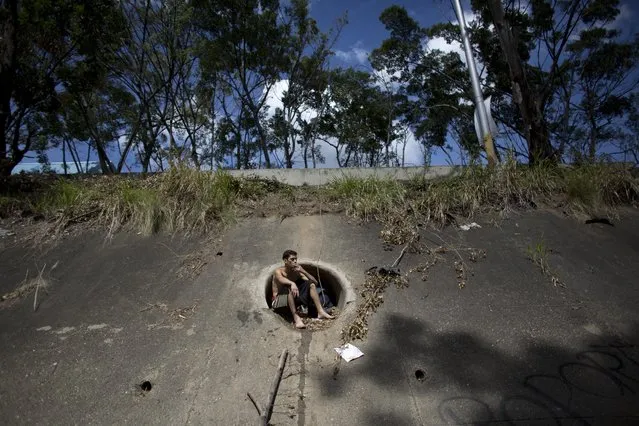
In this December 5, 2017 photo, David Garcia, 19, smokes a cigarette while taking a break during his first week searching the polluted Guaire River for gold and anything valuable he can sell, as he sits on the edge of a drainage pipe, in Caracas, Venezuela. The father of a 4-month-old baby, Garcia said when work dried up organizing block parties he started reselling food he bought after waiting hours in line at grocery stores, but eventually that didn't bring him enough income to feed his family either, so he turned to the river. (Photo by Ariana Cubillos/AP Photo)
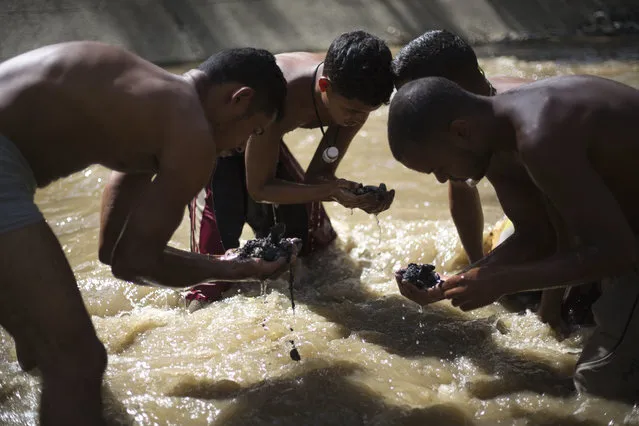
In this December 5, 2017 photo, Angel Villanueva, right, looks for pieces of gold and other valuables in the debris he scooped up from the bottom of the polluted Guaire River, alongside other scavengers, in Caracas, Venezuela. As the 25-year-old scavenges alongside his friends, he's mindful that flash flooding leaves just minutes to get out, or be washed away to his death. Villanueva said he buys food with the money he earns that comes from selling what he finds in the river. (Photo by Ariana Cubillos/AP Photo)
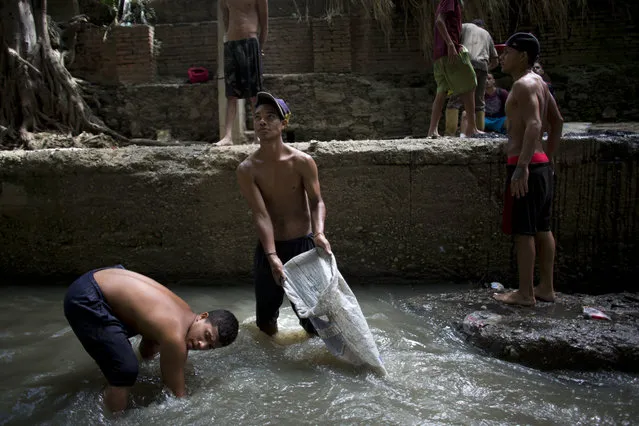
In this November 30, 2017 photo, Douglas, center, holds a sack in the polluted Guaire River as he and others pull mud up from the bed of the river in search of gold and other valuables to sell, in Caracas, Venezuela. The river and the scavengers in it go largely unseen by Caracas residents speeding overhead on the city's main highway, blocked from view by concrete barriers. (Photo by Ariana Cubillos/AP Photo)
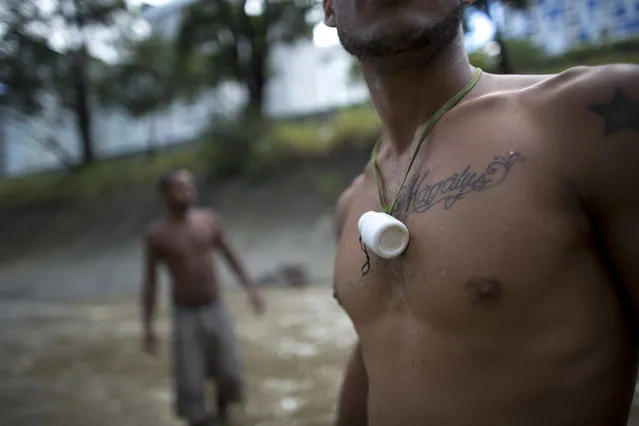
In this December 5, 2017 photo, a medicine bottle hangs from a river scavenger's neck, where he keeps the small pieces of gold and other precious metals he finds on the bottom of the polluted Guaire River, in Caracas, Venezuela. A surge of young men and boys turn each day to the Guaire for survival in Venezuela's deepening crisis, scavenging from the river that runs the distance of Caracas. (Photo by Ariana Cubillos/AP Photo)
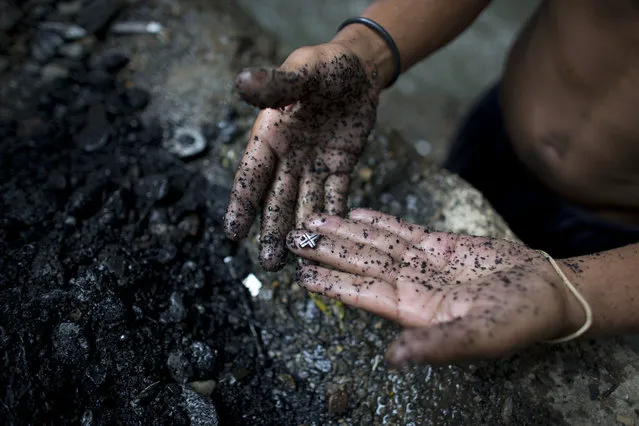
In this November 30, 2017 photo, a river scavenger shows a silver cross he found at the bottom of the polluted Guaire River, in Caracas, Venezuela. Scavengers rake their hands across the river bottom and let the gravel and rocks fall through their fingers, scanning for an earring backing, lost rings or any bits of precious metal to cash in for food. (Photo by Ariana Cubillos/AP Photo)
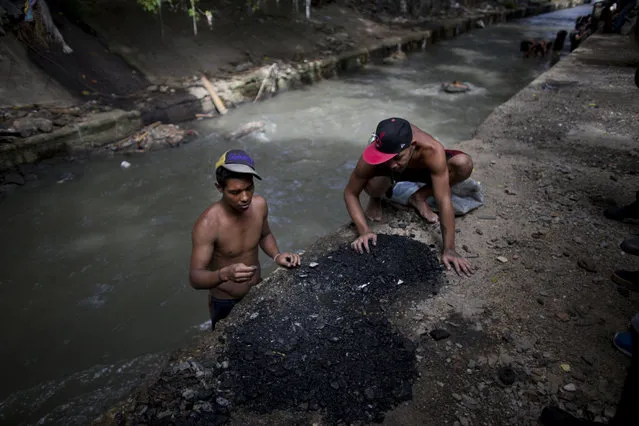
In this November 30, 2017 photo, men sort through the debris they pulled up from the bottom of the polluted Guaire River, in search of pieces of gold and anything of value to sell in Caracas, Venezuela. Venezuela sits atop the world's largest oil reserves, but the global drop in crude prices and plummeting production under nearly two decades of socialist rule has left many in the country of 30 million people struggling to survive. (Photo by Ariana Cubillos/AP Photo)
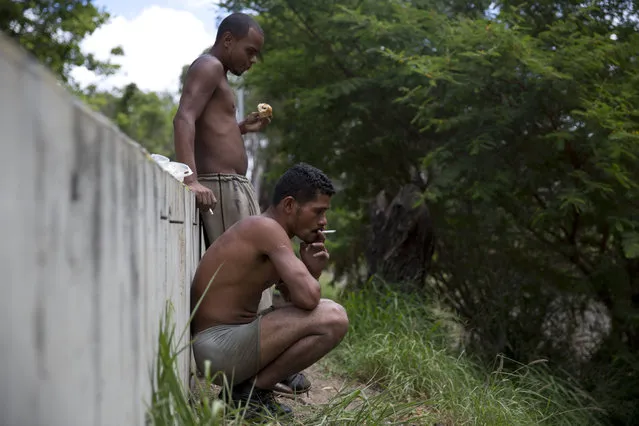
In this December 7, 2017 photo, Felix Diaz smokes a cigarette next to Angel Villanueva eating a piece of bread as they take a break from scraping the bottom of the polluted Guaire River in search of gold and anything of value to sell, in Caracas, Venezuela. “Working in the Guaire isn't easy. It's hard”, said 25-year-old Villanueva. “When it provides, it provides. When it takes, it takes your life”, referring to flash flooding. Diaz, a former security guard who lives with his sister, said he started searching the river nine months ago. (Photo by Ariana Cubillos/AP Photo)
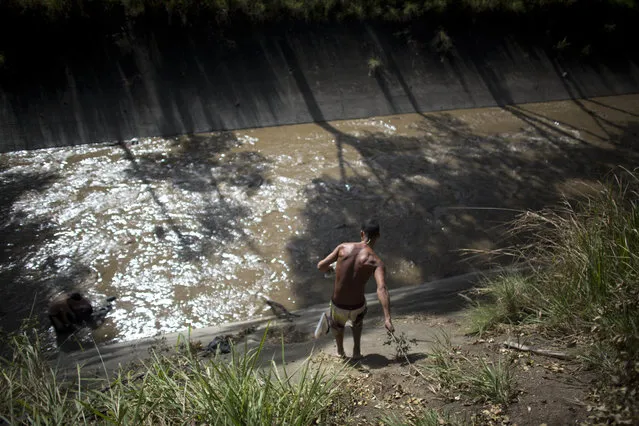
In this December 5, 2017 photo, a man holds on to a branch to lower himself down the concrete bank to the polluted Guaire River where he will search for anything valuable he can sell, in Caracas, Venezuela. Most of the scavengers stream down from hillside barrios, and from afar, they seem to play in the river, but in reality their desperation to earn a living is what pushes them to risk entering the toxic, sewage water. (Photo by Ariana Cubillos/AP Photo)
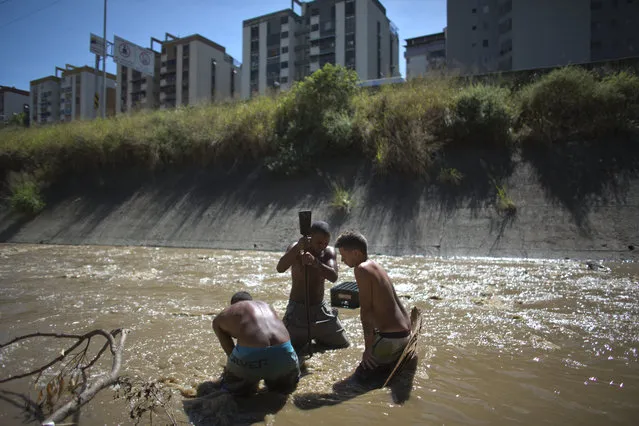
In this December 5, 2017 photo, Angel Villanueva, center, uses a metal bar to break up the mud at the bottom of the polluted Guaire River in Caracas, Venezuela. The 25-year old says people don't want to touch him, or come near because they fear they'll get an infection from him from being in the river, but that he doesn't know of anybody who has died from scavenging the water. (Photo by Ariana Cubillos/AP Photo)
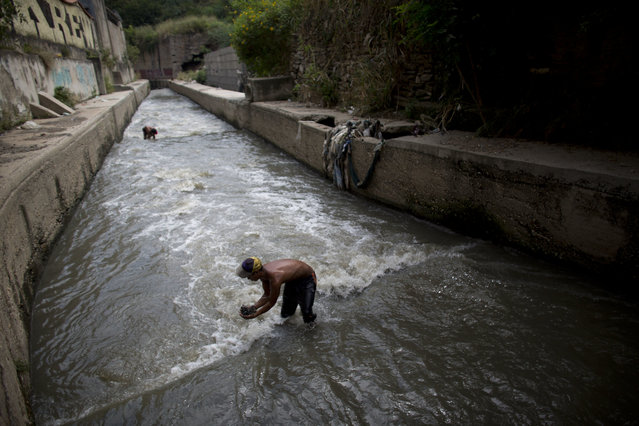
In this November 30, 2017 photo, Douglas scoops up mud from the bottom of the polluted Guaire River, in search of gold and anything valuable he can sell, in Caracas, Venezuela. Some stretches of the river smell of sewer while others emit a toxic odor of fuel, a stench that stays in ones nose for hours after leaving the water. (Photo by Ariana Cubillos/AP Photo)
11 Jan 2018 07:35:00,
post received
0 comments
